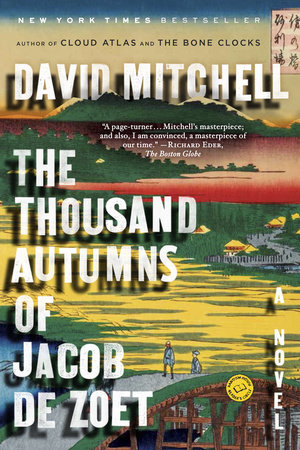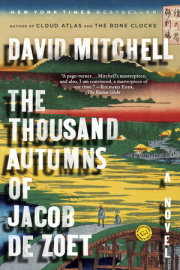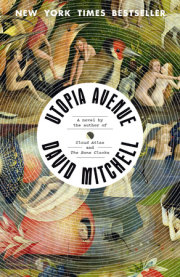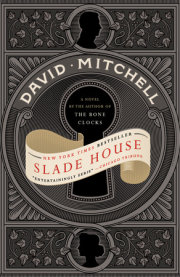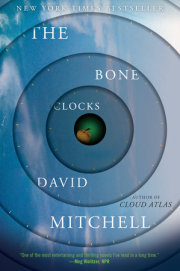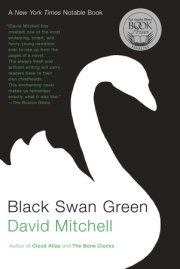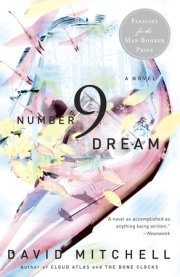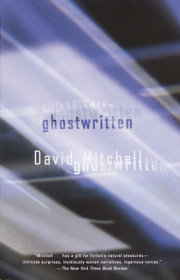Chapter oneThe House of Kawasemi the Concubine, above Nagasaki
The ninth night of the fifth month
"Miss kawasemi?" orito kneels on a stale and sticky futon. "Can you hear me?"
In the rice paddy beyond the garden, a cacophony of frogs detonates.
Orito dabs the concubine's sweat-drenched face with a damp cloth.
"She's barely spoken"-the maid holds the lamp-"for hours and hours. . . ."
"Miss Kawasemi, I'm Aibagawa. I'm a midwife. I want to help."
Kawasemi's eyes flicker open. She manages a frail sigh. Her eyes shut.
She is too exhausted, Orito thinks, even to fear dying tonight.
Dr. Maeno whispers through the muslin curtain. "I wanted to examine the child's presentation myself, but . . ." The elderly scholar chooses his words with care. "But this is prohibited, it seems."
"My orders are clear," states the chamberlain. "No man may touch her."
Orito lifts the bloodied sheet and finds, as warned, the fetus's limp arm, up to the shoulder, protruding from Kawasemi's vagina.
"Have you ever seen such a presentation?" asks Dr. Maeno.
"Yes: in an engraving, from the Dutch text Father was translating."
"This is what I prayed to hear! The Observations of William Smellie?"
"Yes: Dr. Smellie terms it," Orito uses the Dutch, " 'Prolapse of the Arm.' "
Orito clasps the fetus's mucus-smeared wrist to search for a pulse.
Maeno now asks her in Dutch, "What are your opinions?"
There is no pulse. "The baby is dead," Orito answers, in the same language, "and the mother will die soon, if the child is not delivered." She places her fingertips on Kawasemi's distended belly and probes the bulge around the inverted navel. "It was a boy." She kneels between Kawasemi's parted legs, noting the narrow pelvis, and sniffs the bulging labia: she detects the malty mixture of grumous blood and excrement, but not the stench of a rotted fetus. "He died one or two hours ago."
Orito asks the maid, "When did the waters break?"
The maid is still mute with astonishment at hearing a foreign language.
"Yesterday morning, during the Hour of the Dragon," says the stony- voiced housekeeper. "Our lady entered labor soon after."
"And when was the last time that the baby kicked?"
"The last kick would have been around noon today."
"Dr. Maeno, would you agree the infant is in"-she uses the Dutch term-"the 'transverse breech position' "
"Maybe," the doctor answers in their code tongue, "but without an examination . . ."
"The baby is twenty days late, or more. It should have been turned."
"Baby's resting," the maid assures her mistress. "Isn't that so, Dr. Maeno?"
"What you say"-the honest doctor wavers-"may well be true."
"My father told me," Orito says, "Dr. Uragami was overseeing the birth."
"So he was," grunts Maeno, "from the comfort of his consulting rooms. After the baby stopped kicking, Uragami ascertained that, for geomantic reasons discernible to men of his genius, the child's spirit is reluctant to be born. The birth henceforth depends on the mother's willpower." The rogue, Maeno needs not add, dares not bruise his reputation by presiding over the stillbirth of such an estimable man's child. "Chamberlain Tomine then persuaded the magistrate to summon me. When I saw the arm, I recalled your doctor of Scotland and requested your help."
"My father and I are both deeply honored by your trust," says Orito . . .
. . . and curse Uragami, she thinks, for his lethal reluctance to lose face.
Abruptly, the frogs stop croaking and, as though a curtain of noise falls away, the sound of Nagasaki can be heard, celebrating the safe arrival of the Dutch ship.
"If the child is dead," says Maeno in Dutch, "we must remove it now."
"I agree." Orito asks the housekeeper for warm water and strips of linen and uncorks a bottle of Leiden salts under the concubine's nose to win her a few moments' lucidity. "Miss Kawasemi, we are going to deliver your child in the next few minutes. First, may I feel inside you?"
The concubine is seized by the next contraction and loses her ability to answer.
warm water is delivered in two copper pans as the agony subsides. "We should confess," Dr. Maeno proposes to Orito in Dutch, "the baby is dead. Then amputate the arm to deliver the body."
"First, I wish to insert my hand to learn whether the body is in a convex lie or concave lie."
"If you can discover that without cutting the arm"-Maeno means "amputate"-"do so."
Orito lubricates her right hand with rapeseed oil and addresses the maid: "Fold one linen strip into a thick pad . . . yes, like so. Be ready to wedge it between your mistress's teeth; otherwise she might bite off her tongue. Leave spaces at the sides, so she can breathe. Dr. Maeno, my inspection is beginning."
"You are my eyes and ears, Miss Aibagawa," says the doctor.
Orito works her fingers between the fetus's biceps and its mother's ruptured labia until half her wrist is inside Kawasemi's vagina. The concubine shivers and groans. "Sorry," says Orito, "sorry . . ." Her fingers slide between warm membranes and skin and muscle still wet with amniotic fluid, and the midwife pictures an engraving from that enlightened and barbaric realm, Europe . . .
If the transverse lie is convex, recalls Orito, where the fetus's spine is arched backward so acutely that its head appears between its shins like a Chinese acrobat, she must amputate the fetus's arm, dismember its corpse with toothed forceps, and extract it, piece by grisly piece. Dr. Smellie warns that any remnant left in the womb will fester and may kill the mother. If the transverse lie is concave, however, Orito has read, where the fetus's knees are pressed against its chest, she may saw off the arm, rotate the fetus, insert crotchets into the eye sockets, and extract the whole body, headfirst. The midwife's index finger locates the child's knobbly spine, traces its midriff between its lowest rib and its pelvic bone, and encounters a minute ear; a nostril; a mouth; the umbilical cord; and a prawn-sized penis. "Breech is concave," Orito reports to Dr. Maeno, "but the cord is around the neck."
"Do you think the cord can be released?" Maeno forgets to speak Dutch.
"Well, I must try. Insert the cloth," Orito tells the maid, "now, please."
When the linen wad is secured between Kawasemi's teeth, Orito pushes her hand in deeper, hooks her thumb around the embryo's cord, sinks four fingers into the underside of the fetus's jaw, pushes back his head, and slides the cord over his face, forehead, and crown. Kawasemi screams, hot urine trickles down Orito's forearm, but the procedure works first time: the noose is released. She withdraws her hand and reports, "The cord is freed. Might the doctor have his"-there is no Japanese word-"forceps?"
"I brought them along," Maeno taps his medical box, "in case."
"We might try to deliver the child"-she switches to Dutch-"without amputating the arm. Less blood is always better. But I need your help."
Dr. Maeno addresses the chamberlain: "To help save Miss Kawasemi's life, I must disregard the magistrate's orders and join the midwife inside the curtain."
Chamberlain Tomine is caught in a dangerous quandary.
"You may blame me," Maeno suggests, "for disobeying the magistrate."
"The choice is mine," decides the chamberlain. "Do what you must, Doctor."
The spry old man crawls under the muslin, holding his curved tongs.
When the maid sees the foreign contraption, she exclaims in alarm.
" 'Forceps,' " the doctor replies, with no further explanation.
The housekeeper lifts the muslin to see. "No, I don't like the look of that! Foreigners may chop, slice, and call it 'medicine,' but it is quite unthinkable that-"
"Do I advise the housekeeper," growls Maeno, "on where to buy fish?"
"Forceps," explains Orito, "don't cut-they turn and pull, just like a midwife's fingers but with a stronger grip . . ." She uses her Leiden salts again. "Miss Kawasemi, I'm going to use this instrument"-she holds up the forceps-"to deliver your baby. Don't be afraid, and don't resist. Europeans use them routinely-even for princesses and queens. We'll pull your baby out, gently and firmly."
"Do so . . ." Kawasemi's voice is a smothered rattle. "Do so . . ."
"Thank you, and when I ask Miss Kawasemi to push . . ."
"Push . . ." She is fatigued almost beyond caring. "Push . . ."
"How often," Tomine peers in, "have you used that implement?"
Orito notices the chamberlain's crushed nose for the first time: it is as severe a disfigurement as her own burn. "Often, and no patient ever suffered." Only Maeno and his pupil know that these "patients" were hollowed-out melons whose babies were oiled gourds. For the final time, if all goes well, she works her hand inside Kawasemi's womb. Her fingers find the fetus's throat, rotate his head toward the cervix, slip, gain a surer purchase, and swivel the awkward corpse through a third turn. "Now, please, Doctor."
Maeno slides in the forceps around the protruding arm.
The onlookers gasp; a parched shriek is wrenched from Kawasemi.
Orito feels the forceps' curved blades in her palm: she maneuvers them around the fetus's soft skull. "Close them."
Gently but firmly, the doctor squeezes the forceps shut.
Orito takes the forceps' handles in her left hand: the resistance is spongy but firm, like konnyaku jelly. Her right hand, still inside the uterus, cups the fetus's skull.
Dr. Maeno's bony fingers encase Orito's wrist.
"What is it you're waiting for?" asks the housekeeper.
"The next contraction," says the doctor, "which is due any-"
Kawasemi's breathing starts to swell with fresh pain.
"One and two," counts Orito, "and-push, Kawasemi-san!"
"Push, Mistress!" exhort the maid and the housekeeper.
Dr. Maeno pulls at the forceps; with her right hand, Orito pushes the fetus's head toward the birth canal. She tells the maid to grasp the baby's arm and pull. Orito feels the resistance grow as the head reaches the aperture. "One and two . . . now!" Squeezing the glans of the clitoris flat comes a tiny corpse's matted crown.
"Here he is!" gasps the maid, through Kawasemi's animal shrieks.
Here comes the baby's scalp; here his face, marbled with mucus . . .
. . . Here comes the rest of his slithery, clammy, lifeless body.
"Oh, but-oh," says the maid. "Oh. Oh. Oh . . ."
Kawasemi's high-pitched sobs subside to moans, and deaden.
She knows. Orito discards the forceps, lifts the lifeless baby by his ankles and slaps him. She has no hope of coaxing out a miracle: she acts from discipline and training. After ten hard slaps, she stops. He has no pulse. She feels no breath on her cheek from the lips and nostrils. There is no need to announce the obvious. Splicing the cord near the navel, she cuts the gristly string with her knife, bathes the lifeless boy in a copper of water, and places him in the crib. A crib for a coffin, she thinks, and a swaddling sheet for a shroud.
Chamberlain Tomine gives instructions to a servant outside. "Inform His Honor that a son was stillborn. Dr. Maeno and his midwife did their best but were powerless to alter what Fate had decreed."
Orito's concern is now puerperal fever. The placenta must be extracted, yakumosô applied to the perineum, and blood stanched from an anal fissure.
Dr. Maeno withdraws from the curtained tent to make space.
A moth the size of a bird enters and blunders into Orito's face.
Batting it away, she knocks the forceps off one of the copper pans.
The forceps clatters onto a pan lid; the loud clang frightens a small creature that has somehow found its way into the room; it mewls and whimpers.
A puppy? wonders Orito, baffled. Or a kitten?
The mysterious animal cries again, very near: under the futon?
"Shoo that thing away!" the housekeeper tells the maid. "Shoo it!"
The creature mewls again, and Orito realizes it is coming from the crib.
Surely not, thinks the midwife, refusing to hope. Surely not . . .
She snatches away the linen sheet just as the baby's mouth opens.
He inhales once, twice, three times; his crinkled face crumples . . .
. . . and the shuddering newborn boiled-pink despot howls at Life.
Copyright © 2010 by David Mitchell. All rights reserved. No part of this excerpt may be reproduced or reprinted without permission in writing from the publisher.

